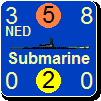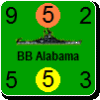warspite1
Posts: 41353
Joined: 2/2/2008
From: England
Status: offline

|
quote:
ORIGINAL: Centuur
The war at sea is a strange thing, IMHO. If you truly look at how things went, one often concludes that it is not the skill of the commanding officers which makes a difference, but pure and simple luck.
It was a lucky shot which killed of the Hood (sure, if the ship had been armoured better, this wouldn't have happened, but the granate could have missed)...
It was a lucky event, that the Bismarck was found and hit by the Swordfish planes...
It was pure luck, that at Midway, the Japanese were caught with their carriers full of planes...
It was lucky that the Japanese plane did spot the Repulse and the Prince of Wales
And on and on and on.
The war at sea depends on finding the enemy in the first place. Now, in the small North Sea, this is somewhat easy, but in the big ocean...
We keep looking for reasons why things happened at sea the way they did. Which to me, is complete BS. It all comes back to a simple thing: there are no good admirals or bad admirals. Only lucky and unlucky ones...
warspite1
quote:
We keep looking for reasons why things happened at sea the way they did. Which to me, is complete BS
quote:
It all comes back to a simple thing: there are no good admirals or bad admirals. Only lucky and unlucky ones...
Well that is a pretty bizarre viewpoint – to dismiss a thousand plus years of naval warfare as BS is pretty extreme, not to mention unfair and plain wrong.
Not sure why naval warfare is singled out either?? Furthemore, what level of command are you referring to? Just Admirals?
There are so many levels on which this judgement is wrong that it is difficult to know where to begin.
Of course luck – good and bad is present everywhere in life. If it wasn’t then Holland would have won the World Cup in 1974 and Hungary in 1954…. Battles – a great many battles – have been won and lost because of critical luck at one point or other, but why do you say this only applies to sea battles? You must have heard Napoleon’s response to the possible promotion of a subordinate general – “Yes, but is he lucky?” Battles – a great many battles – have been won and lost because of critical luck at one point or other, but why do you say this only applies to sea battles? You must have heard Napoleon’s response to the possible promotion of a subordinate general – “Yes, but is he lucky?”
Why can an Admiral not be praised for a success, while an Army general can? You have mentioned Midway specifically, but what is different about that battle as opposed to say Case Yellow?
Sure Erich von Manstein wins the plaudits for the plan to defeat France. But you have also surely heard the maxim no plan survives contact with the enemy? How much different history may have been had this bold and exciting plan gone pear shaped (as it so easily could have). Yes Manstein is rightly praised; the plan caught the Allies off guard by doing the unexpected, yes the German knew (and sought to exploit) the fact that the Ardennes was lightly defended. But he could not know, he did not know, to what extent the French left the river crossings unguarded, and the snails place in which Gamelin, still fighting WWI, could react. With just a few things panning out differently that plan could have been an utter failure.
The position of an Admiral is no different. In battle, reacting to events, guessing the intentions of the enemy, making use of the weather conditions where appropriate, making best use of one’s own equipment and exploiting the weaknesses of the enemy is all part and parcel of the job. A good Admiral will promote the right men, fire the bad ones, and act with energy. To simply say a monkey could do the job and that its all down to luck beggar belief.
Mention has already been made of the Battle of Midway. So if you were to write a book on the battle it would consist of:
Midway – by Centuur
Chapter 1
Nimitz was lucky
Chapter 2
Yamamoto was unlucky
Conclusion
Its all BS.
Okay…...
So was Nimitz lucky and Yamamoto unlucky? Well, as said above, luck played its part but it does not take much research to realise that there was far more to it than that. Ever heard of making your own luck? For example was Nimitz lucky that he ordered Yorktown (which apparently could not be repaired for months) to be ready in days? No, that is not luck that is recognising the threat and doing all you can to meet it.
Was Yamamoto unlucky that he did not have enough carriers concentrated for the operation? Well in total contrast to the US and Yorktown, what was the Japanese response to Coral Sea? Japanese carrier aircraft were closely linked to their parent carrier. So when Shokaku was badly damaged, but had planes, and Zuikaku was undamaged, but had no aircraft, how did Yamamoto react? Well he could have joined the two together and at least gone to Midway with one more fleet carrier - but we know how he reacted don't we?
You airily dismiss the intelligence as nothing. That is incredible. The US had the intelligence – they knew through a clever ruse that Midway was the target. Nimitz also knew he was out-numbered. What did he do? Toss a coin – because it’s all luck right? No, he picked his best men for the job, he got his outnumbered ships together (including Yorktown) and formed a plan of action.
With many of the aces up his sleeve, what did Yamamoto do? Well he ignored the very possibility that the US would see them coming (much less have any intelligence on the Japanese plan) and – as was the Japanese way – simply decided that the enemy would act as they wanted them to act. There was no Plan B, there was no allowance made for other possibilities. Is that simply bad luck or shoddy Admiralship (if there is such a word)?
These are just two examples. There are many more. Despite everything, could Nimitz’s plan have gone wrong? Yes of course, just as von Manstein’s plan could have blown up in his face. But the two are rightly praised for what they did, that there was some luck along the way, yes of course, but that’s life. The fact there was luck involved does not make everything BS.
_____________________________
England expects that every man will do his duty. Horatio Nelson October 1805  |
 Printable Version
Printable Version











 .
. 







 New Messages
New Messages No New Messages
No New Messages Hot Topic w/ New Messages
Hot Topic w/ New Messages Hot Topic w/o New Messages
Hot Topic w/o New Messages Locked w/ New Messages
Locked w/ New Messages Locked w/o New Messages
Locked w/o New Messages Post New Thread
Post New Thread